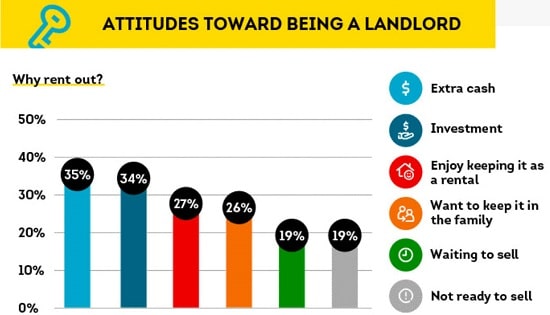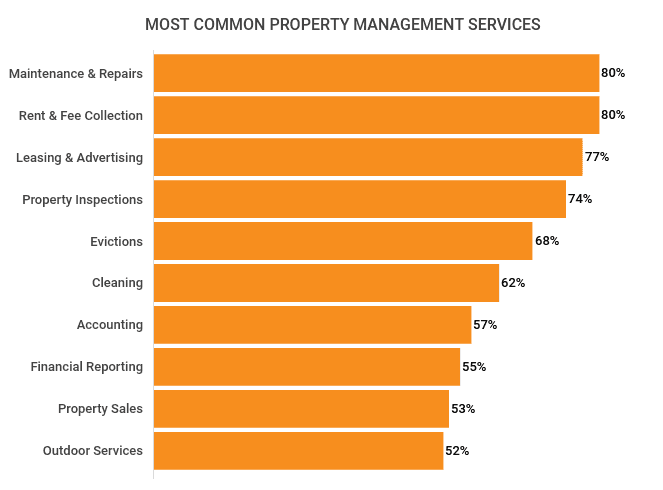Individuals
How to Rent Out Your House While Living Overseas

Last updated: March, 2022
Renting out your home while you are overseas is a cost-effective way to earn extra income and build equity, while making sure your home is being cared for. Many expats use rental income to reinvest in real estate upon their return home or use the cash to purchase a new home in their host country. However, being both an expat and a landlord can be tricky, and renting property while living abroad comes with its own learning curve.
Here are some steps that can help make the process smoother and help you offset those monthly mortgage payments.
In this guide we will cover the following:
- Do Your Research and Communicate with Relevant Parties
- Find a Reliable Property Manager
- How to Become Your Own Property Manager
- Where to Post Property Online
- How to Collect Rent
- Protect Your Home with a Landlord & Property Insurance
Why Homeowners Become Landlords

Do Your Research and Communicate with Relevant Parties
If this is your first time renting out your home as an expat, make sure to research current rental values, future market trends, and rules around letting your property. Prior to renting out your property, you need to make sure your mortgage lender and your insurance agency both understand your intentions.
Communicate with all relevant parties to ensure that your home can be rented out, as certain lenders or homeowner associations may have specific rules about property rental. Depending on your current mortgage or rental agreement, it may be illegal to rent your property out.
Contact your lender and obtain prior consent for your intention to rent out the property while you are overseas. If they agree, moving forward should not be an issue but make sure, to get everything in writing!
As you conduct your research, be sure to review any domestic property insurance coverage. Be aware that terms of coverage may alter when a new tenant moves in, so it’s important to understand what changes were made and what protections you carry. This can get expensive, but it’s a necessary cost of doing business as a landlord.
Renting out your property also comes with its own set of tax considerations. When you rent out your property, any rent payments are classified as income and can be subjected to income tax. There may be certain ways to help reduce your tax liability, so it’s important to communicate with your tax advisor as you start the process.
Find a Reliable Property Manager for Your House
Although you might be on the other side of the world, you’re still responsible for your tenants and managing the property. If you decide to rent out your house when you relocate abroad, traveling back and forth from another country may get expensive and stressful, so a qualified and effective property manager could be a worthwhile investment.
Your property manager will help you find tenants, check in on your property, coordinate property repairs, take care of billing needs and contracts, and keep you informed of news and events going on with your tenants. They will also help you create a strong tenancy agreement, which can alleviate the cost of hiring an attorney to write one.
Most importantly of all, your property manager will give you the peace of mind to live and work comfortably while abroad.
Many larger management companies work for communities that have multiple homes and won’t take on an individual who is renting out his or home, which limits the pool of potential managers for you to hire.
You should get a property manager if your time is limited, or if you’d just prefer to delegate many of the responsibilities that come with being a landlord. Additional services that you’ll be offloading if you hire a property manager include maintenance and repairs, rent and fee collection, and evictions.
Most Common Property Management Services

Here are a few resources that can help you find a property manager; however, asking family, friends, and colleagues for local recommendations and references can really make all the difference in establishing a trusting relationship with a property manager:
- The National Association of Residential Property Managers
- All Property Management
- Manage My Property
- Institute of Real Estate Management
How to Become Your Own Property Manager While Living Abroad
If you really want to maximize your income, you can let your house or apartment on your own while living abroad. But there are some factors you need to consider.
These include maintenance and repairs, finding tenants, and writing rental contracts. As the landlord, it’s incumbent on you to get repairs done in a timely and effective manner. Otherwise, you may face penalties or a lawsuit. Find a reliable repair person and develop a relationship with him or her. If you’re offering steady work, you should be able to negotiate a good rate or a monthly plan.
As the property manager, all administrative paperwork is your responsibility. You will be responsible for finding and replacing a tenant; you will also be involved in conducting background, credit, employment verification, and reference checks. Furthermore, you will be responsible for writing and reviewing all rental contracts (unless you hire an attorney).
Becoming your own property manager as and expat living overseas is doable if you have the time and resources. However, it may be a challenge if you are living abroad or aren’t easily accessible. As the property manager, YOU are your tenant’s contact point, so it’s important that you are available.
It can also be useful to have a family member or close friend serve as a contact person for the tenant when issues arise. This person can also serve as a neutral messenger when addressing difficult issues with tenants such as a tenant not paying their rent on time or making noise that results in complaints from a neighbor.
Here are some online resources where you can learn more about becoming your own property manager. Working with an attorney may offer additional insight and protections that you may not have been aware of:
Knowing what’s going on in the home you own is natural but checking in isn’t as easy as it may seem. Your apartment or house will be the tenant’s home, and tenants have a right to privacy.
In general, a landlord is not allowed to enter a tenant’s home to “check in” on things and needs sufficient cause to do so. Setting up security cameras is not an option, as that can be considered stalking, and could lead to criminal charges. Your best bet is to have people you know and trust drive by the home occasionally to check for signs that something is amiss.
Also, if a repair is needed, the person making the repair can give you an update about the apartment. But be careful here. Although the tenant may not be caring for the home the way you would, this does not mean that he or she is in violation of the landlord-tenant agreement. Respect your tenant’s space but also find ways to check in from time to time.
Where to Post Property Online to Meet Prospective Renters
In addition to a real estate agent, there are lots of places online to list your home for rent while you are living abroad. Local newspapers and Craigslist are still great and useful options, but major property management websites, such as Realtor, Redfin, and Zillow remain key sources for classified listings.
There also are sites specifically devoted to the real estate market:
- ApartmentList, Oodle, and ApartmentFinder offers free listings in the United States.
- Trulia is an attractive and simple property listing site that allows renters to set filters to see a group of photo listings with statistics about the property underneath.
- Airbnb is one of the well-known websites for people to rent out their homes, usually on a daily, weekly, or monthly basis, for people on vacation or people who need a place to stay. It offers free listings for apartments around the world.
- Hotpads is great, especially if you own unit(s) jn multi-family buildings. The site also caters to pet owners with pet information listed upfront.
- Sublet.com offers free listings for every type of rental housing (sublets, apartments, houses, vacation rentals) across the globe.
When posting your classified ad, be as honest as possible. Don’t try to upsell aspects of the property that don’t exist—you will be wasting your time. Be upfront about your rules and expectations with the tenant, and again, make sure to get all consents and agreements in writing.
How to Collect Rent
There are multiple ways that you can collect your rent even if you are living abroad.
- You can work with your bank to set up payments or bank-to-bank transfers electronically.
- You also can accept credit card payments with your iPhone or tablet via companies such as paysimple.com, Zelle Pay, or PayPal.
- Payment by check is a bit trickier, as checks should be sent to a friend or family member who can deposit them for you.
Establish firm deadlines and send out reminder emails a few days before the rent is due. It may also help to include reminders of payment methods. Make sure that you have noted any late payment fees as part of your rental agreement.
As mentioned above, money you make from renting an apartment or house is income, regardless if you live overseas or not, and you will need to file accordingly and pay for taxes. Be sure to keep records of how much you are paid, and also what you spend on expenses, such as repairs.
Protect Your Home with a Landlord and Property Insurance
If you own your home, you many need more protection than what your homeowner’s insurance policy covers.
You may be able to add an endorsement for a secondary residence to your policy if you’re renting out your home for a short term. Another option is to purchase a home warranty that can help service repairs on your behalf—many companies offer customizable plans that allow you to get repairs done after paying a small deductible. Be sure to research several warranty companies and check all terms and conditions as some warranties do not cover pre-existing conditions in the home.
In addition, anyone renting out their house as an expat for a long period of time may need landlord insurance, which can offer supplementary protections, and also can cover rental income you risk losing if the apartment our house ever becomes uninhabitable when its undergoing repairs.
Overall, it’s safe to assume that you will have a lot on your plate while living abroad and managing your property in your home country. As you journey abroad and make the decision to rent out your property, keep yourself protected with the proper safeguards in place.
International personal insurance will give you peace of mind while living abroad and you will always need personal property protection or renters insurance for your valuable belongings in your home overseas.
Landlord’s insurance in the US provides coverage for damage caused by tenants including:
- personal property
- physical structures
- fair rental value for properties rendered unavailable
- inflation protection
- claims against you for accidental damage
Related Helpful Content
Find tips, trends, and perspectives to help you confidently make decisions and navigate challenges internationally with peace of mind. Read how you can live, operate, and manage risks abroad.
An Expat’s One-Stop Guide to Driving in Ireland
Steering Through Spuds and Sheep: Tips for Driving, Requirements, Traffic Rules,
Tips for Driving in France: an Expat’s Guide
Driving in France is a great way to explore the country’s
12 Best Scenic Drives & Road Trips in the UK & Ireland
For expats in the United Kingdom or business travelers who wind